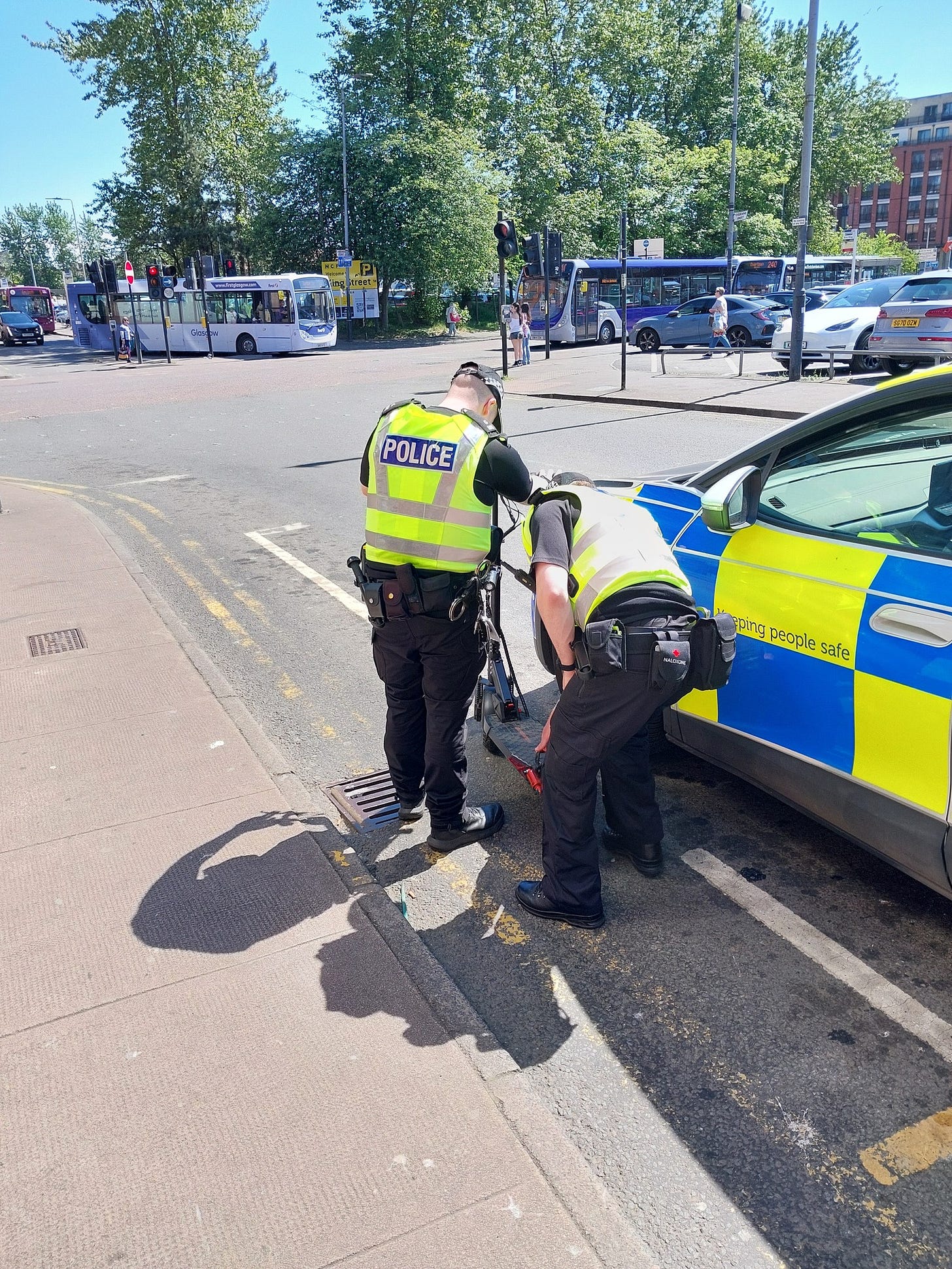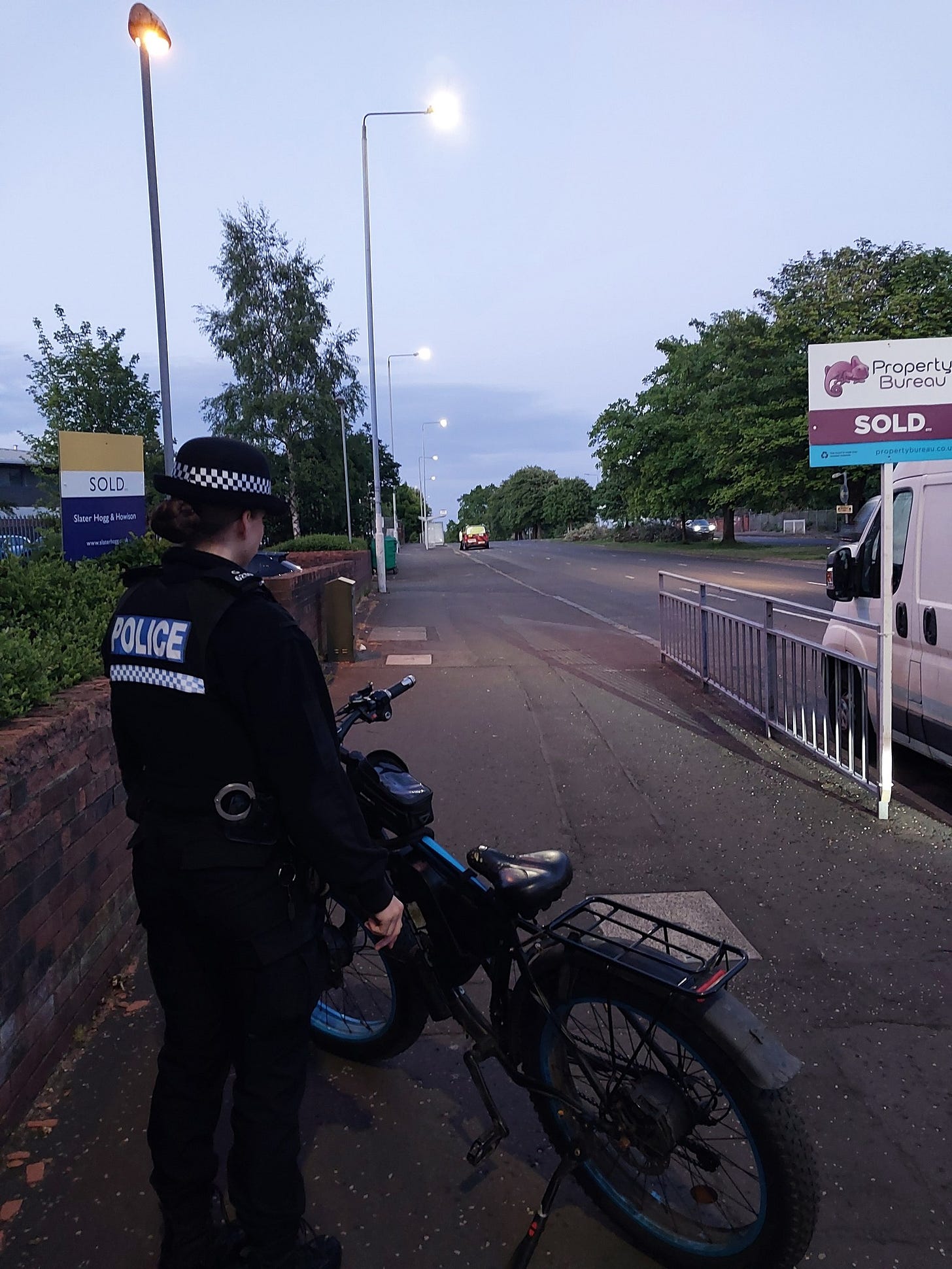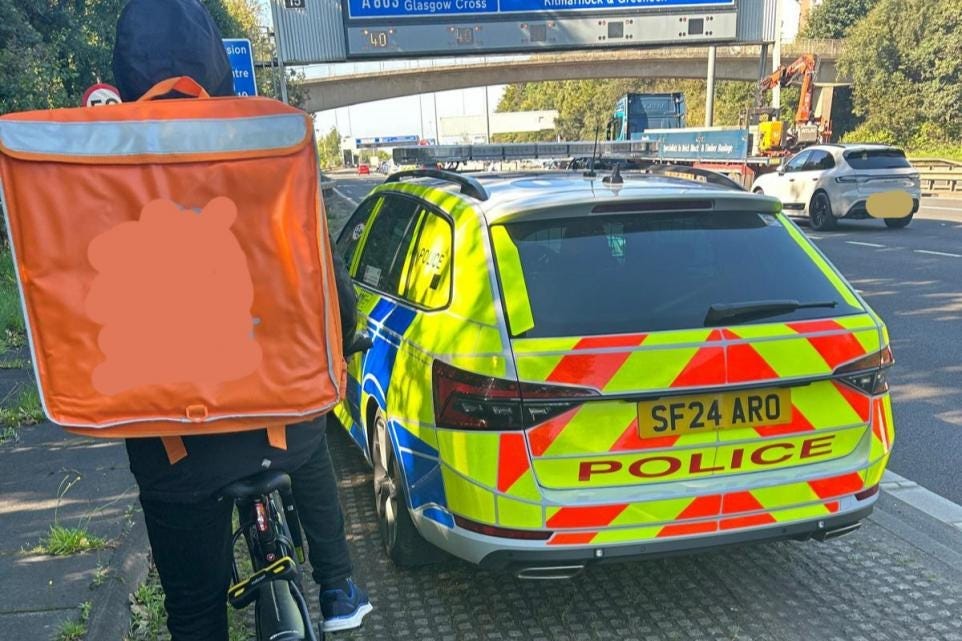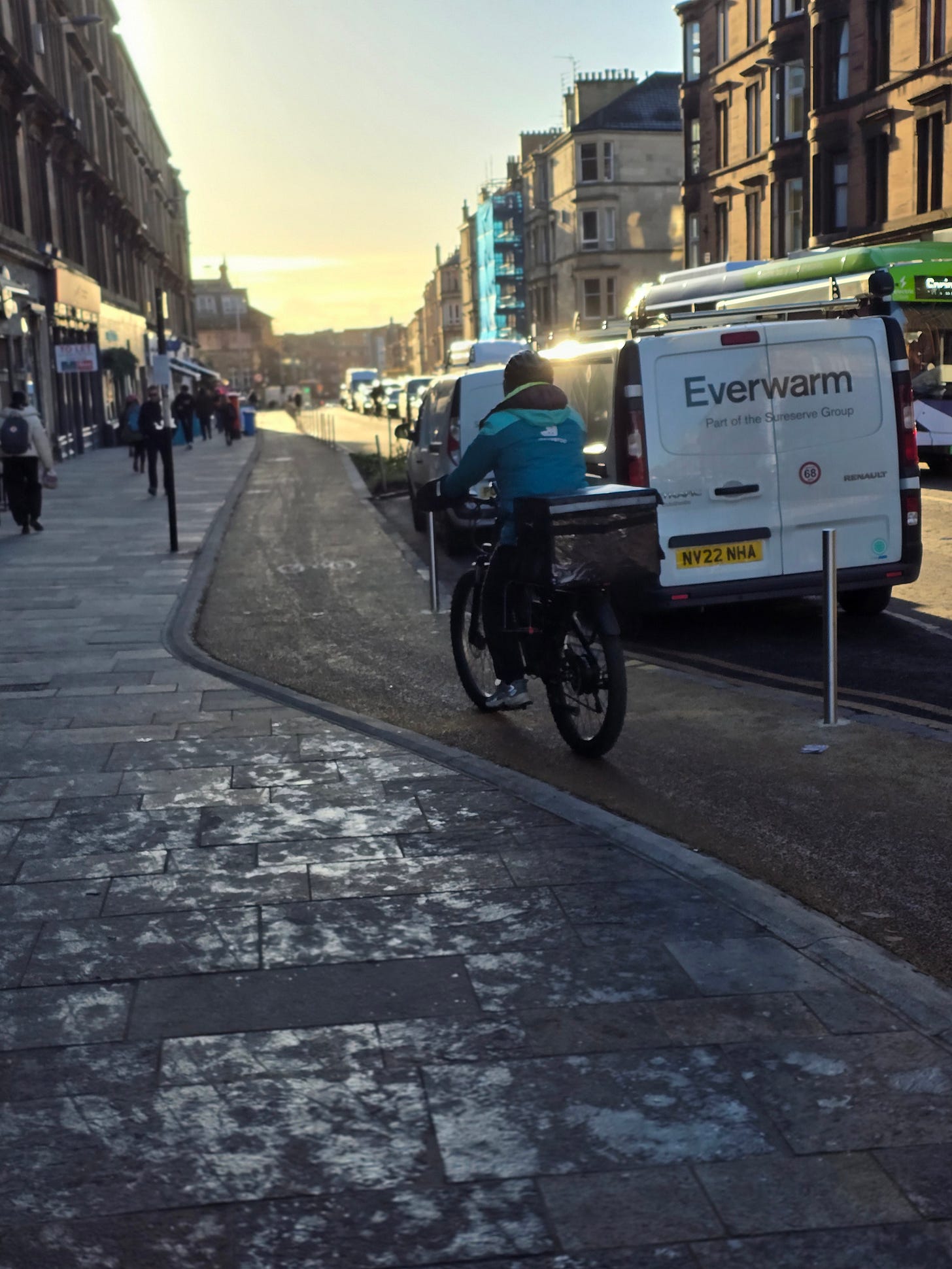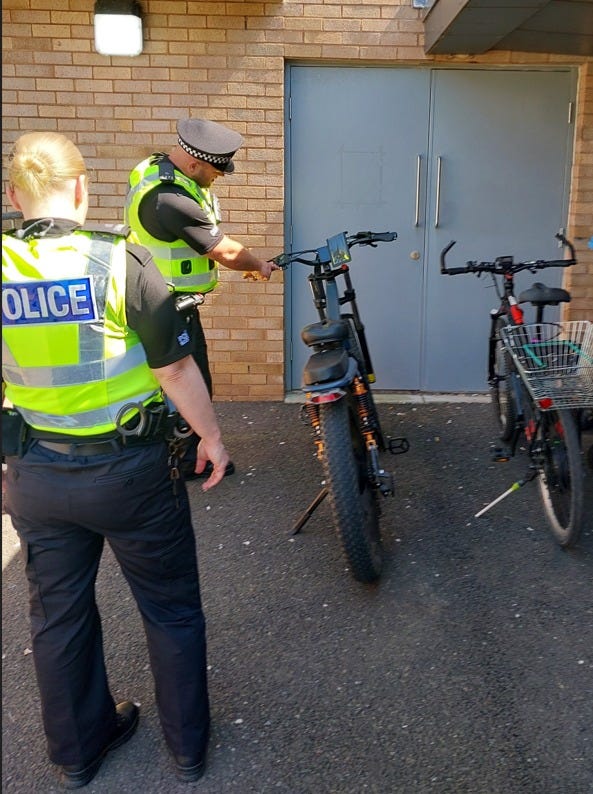EXCLUSIVE: Police Seize 21 Illegal E-Bikes and Scooters in One-Day Glasgow Blitz
16 Riders Caught in Day of Action
Oops... we hit publish a bit early yesterday — but hey, mistakes happen!
So here it is properly today, and totally FREE for everyone to enjoy.
If you like stories like this, why not help keep The Splash splashing? We’re Glasgow’s only truly born-and-bred, community-powered news outlet — no clickbait, no shareholders, no ads, no suits, and definitely no yachts.
Just 9p a day helps us hold power to account (and maybe hire someone to stop us pressing the wrong buttons).
Support independent journalism with a sense of humour — sign up today!
EXCLUSIVE by Gary Fanning
A police crackdown on rogue e-bike and e-scooter riders in Glasgow saw 21 vehicles ripped off the streets and 16 riders hauled in for prosecution – all in just ONE day!
The high-stakes operation marks a major blow in the fight against reckless and dangerous riding that’s turning the city’s streets into a wild, lawless zone.
We've compiled a detailed breakdown of where the action took place across Glasgow. It's all laid out for our paid members.
In total, 18 e-bikes and 3 e-scooters were taken off the streets, with offences including riding without insurance or a licence, dangerous driving, and even using a mobile phone while riding.
A Freedom of Information request submitted by The Splash to Police Scotland revealed a breakdown of seizures by police sub-division area:
GA (Glasgow South West) : 6 e-bikes
GF (Glasgow North): 1 e-scooter
GJ (East Dunbartonshire): 2 e-bikes, 2 e-scooters
GU: (Glasgow North West) 4 e-bikes
GK (Glasgow East): 1 e-bike
GD/GE: (Glasgow East) 2 e-bikes
Among the catalogue of offences were:
No insurance or licence (multiple areas)
Dangerous and careless riding
Running red lights
Riding unregistered or unroadworthy vehicles
No helmets, no L-plates, and other safety breaches
Police warned that heavily modified e-bikes capable of dangerous speeds are becoming a menace on Scotland’s streets – often lacking proper brakes and being ridden without a licence, insurance or regard for pedestrians.
In March, the Splash reported that police in Glasgow had seized dozens of e-bikes in a crackdown on illegal and dangerous riding, amid mounting calls for tougher regulations following a series of alarming incidents.
Officers carried out a Day of Action in December targeting electric bikes in the city centre, resulting in 24-e bikes being seized and 102 offences reported to the Procurator Fiscal.
While the seizures and prosecutions indicate serious enforcement action, the growing volume of modified, high-speed e-bikes calls for a deeper discussion on regulation, licensing, and insurance requirements.”
Some residents have described city-centre pavements in Argyle Street as "racetracks", with riders zooming along pedestrian precincts at breakneck speeds
In one recent incident, an 18-year-old man was left in critical condition following an e-scooter crash in Castlemilk.
Last year, an 89-year-old woman was struck by an e-bike at the junction of Renfield Street and Sauchiehall Street, setting back her recovery from hip surgery..
Another woman carrying her child narrowly avoided being hit by a Deliveroo rider near Charing Cross, while a man was struck by an e-bike outside The Gushet in Shawlands.
Police stopped one e-bike delivery rider last year for cycling on the M8 motorway near Townhead — dangerously close to oncoming traffic.
Hillhead residents have also raised concerns about delivery riders speeding along Byres Road, describing the situation as “an accident waiting to happen.”
In an email to The Splash, a resident reported similar problems in Kelvingrove and Yorkhill.
She highlighted that many delivery riders wear dark clothing and fail to equip their bikes with lights, creating a significant hazard as daylight hours shorten in the winter.
“The issue has been raised with delivery companies, but they seem unwilling to take meaningful action,” she wrote.
“This highlights the urgent need for legislation, especially around insurance.”
She questioned whether delivery riders, if self-employed, have public liability insurance for accidents, adding: “And if they’re employees, are delivery companies providing sufficient coverage?”
Police Scotland ramped up patrols at the Govan to Partick footbridge in response to growing complaints about e-bikes and vandalism near the Riverside Museum.
Beyond safety concerns, e-bike battery fires have prompted debates in the House of Lords. As part of the Product Regulation and Metrology Bill, lawmakers are addressing the risks of lithium-ion batteries, which have caused a 46 per cent increase in fires between 2022 and 2023.
Baroness Finlay of Llandaff highlighted a tragic incident in Cambridge where a battery explosion claimed the lives of a mother, Gemma, and her two children in June 2023. Her partner remained in a coma for a month.
The debate has also drawn attention to online marketplaces that sell potentially dangerous e-bike conversion kits.
David Gow, 79, pictured above, died in February 2024 after being hit by an off-road motorbike in Glasgow’s Balmore Road
His son Craig and brother Allan Gow, an SNP councillor, are campaigning for stricter regulations on off-road vehicles, including mandatory registration to improve policing and safety.
They’re urging Glasgow City Council to work with both the Scottish and UK governments to address the issue.
Allan’s motion also includes e-bikes and e-scooters, which can be dangerously modified. Despite previous efforts for legal changes stalling, discussions continue with local MPs and the Scottish Government. The goal is to reduce the harm caused by dangerous vehicle misuse in both urban and rural areas.
Police acknowledge the severity of the issue but admit they are struggling to keep up.
“We know it’s a real problem,” a police spokesperson said. “We stop these riders and charge them with multiple offences — sometimes up to seven at a time. We seize their bikes, but within the hour, they’re back on another one, supplied by their delivery company.”
Many delivery companies lease e-bikes to riders, making it easier for offenders to quickly obtain replacement bikes with little oversight.
On busy days, officers have confiscated as many as 14 e-bikes, only to see the same riders back on the streets within half an hour.
“I wish I had a magic wand,” one officer said. “But with an endless supply of bikes, there’s only so much we can do.”
The growing backlash has led to calls for mandatory licensing and registration plates for e-bike riders.
Under current UK laws, e-bikes with a maximum motor output of 250 watts and a top speed of 15.5mph are treated like conventional bicycles and do not require insurance or registration.
However, illegally modified bikes or those exceeding these limits are classed as motor vehicles and must be licensed and insured.
A Scottish Government spokeswoman said: “Regulations on e-vehicles are reserved, so this would be for the UK Government.”
A UK Government spokesperson added: “There are strict laws in place for e-cycles, including a 15.5 miles-per-hour speed limit for electrical assistance. Anybody found breaking these rules will be prosecuted by the police.”
But a Splash request for detailed enforcement data on the illegal and dangerous use of e-bikes and e-scooters across Glasgow has been refused by Police Scotland due to the excessive cost of compliance.
The Freedom of Information (FOI) request sought comprehensive statistics and documentation covering enforcement activity from 1 January 2023 to the present.
Specifically, the requester asked for the total number of seizures, the number of offences reported to the Procurator Fiscal, offence types, enforcement locations, and copies of relevant reports or summaries involving e-bikes and e-scooters.
However, Police Scotland responded that fulfilling the request would “cost well in excess of the current FOI cost threshold of £600,” and therefore invoked Section 12(1) of the Freedom of Information (Scotland) Act 2002 – which allows public authorities to refuse requests that would be too expensive to process.
In explaining the refusal, Police Scotland highlighted a key challenge: there are no incident or crime classifications specific to e-bikes or e-scooters.
As a result, identifying relevant cases would require a manual search through thousands of records, significantly driving up the time and cost of processing the request.
The force further explained that enforcement against e-bikes and e-scooters typically relies on broader legal definitions set out in the Road Traffic Act 1988.
Officers must determine whether a vehicle meets the definition of a "motor vehicle" under Section 185 of the Act — a process that requires sufficient supporting evidence.
Where a vehicle fails to meet that threshold, alternative legislation such as Section 4 of the Road Traffic Act 1988 (concerning impairment through drink or drugs) or Section 127 of the Antisocial Behaviour etc. (Scotland) Act 2004 may be applied.
Despite the lack of granular data, Police Scotland insists that enforcement remains a priority.
The force has launched targeted initiatives across various parts of the country in response to rising public complaints about e-bikes and e-scooters being used on footpaths and roads.
Offences include anti-social behaviour and breaches of road traffic law.
“Police Scotland is committed to dealing with the illegal use of e-bikes and e-scooters,” a spokesperson told The Splash.
“We continue to respond to public concerns and take enforcement action where appropriate.”
The refusal underscores the growing complexity of regulating new forms of transport in the absence of specific legal frameworks and record-keeping categories.
Given the continued rise in illegal and dangerous e-bike and e-scooter usage, residents, lawmakers, and police alike must come together to push for stronger regulations—such as mandatory insurance, rider registration, and stricter penalties for modifications—that can protect both riders and pedestrians.
The Splash is proud to be Glasgow’s only truly independent, community-driven journalism
We’re a Community Interest Company — no clickbait, no shareholders, no adverts, no sponsors, and no greedy CEOs. Every penny we make is reinvested directly into high-quality, grassroots journalism for Glasgow.
A huge thank you to all our new paid subscribers — we truly couldn’t have come this far without you. But to keep The Splash sustainable, we need at least one new paid subscriber for every story we publish. If you value independent journalism and want to see more stories like this, please consider subscribing today.
Right now, you can get 50% off – that’s just 9p a day.
Support real journalism. Stay informed. Back The Splash





